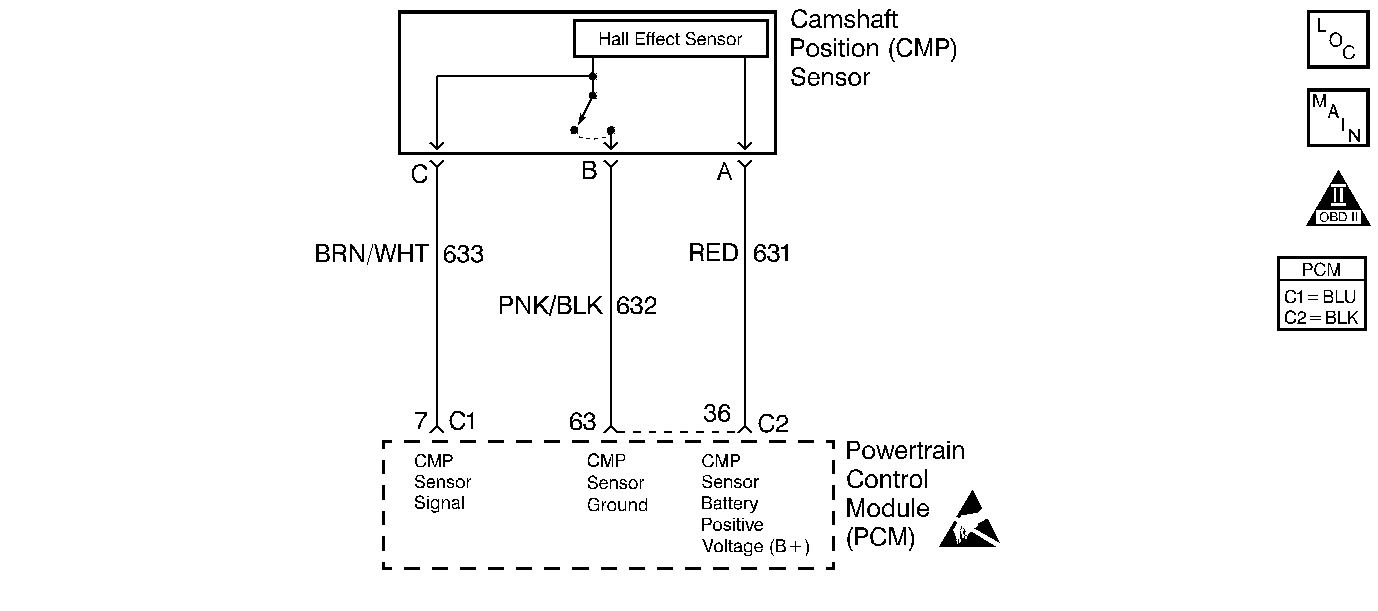
Circuit Description
The camshaft position (CMP) sensor correlates the crankshaft to camshaft position so that the Powertrain Control Module (PCM) can determine which cylinder is ready to be fueled by the injector. The CMP sensor also determines which cylinder is misfiring when a misfire is present. If the PCM receives an intermittent signal from the CMP, then the CMP Resync Counter will increment. When the PCM cannot use the information from the CMP sensor, a DTC is set and the PCM will fuel the engine by using the alternating synchronous double fire (ASDF) method.
Conditions for Setting the DTC
| • | The engine is running. |
| • | The CMP Active Counter is not incrementing. |
Action Taken When the DTC Sets
| • | The malfunction indicator lamp (MIL) illuminates. |
| • | The PCM records the operating conditions at the time when the diagnostic fails. This information stores in the Freeze Frame and Failure Records buffers. |
| • | A history DTC stores. |
| • | The coolant fan turns ON. |
Conditions for Clearing the MIL/DTC
| • | The MIL will turn OFF after three consecutive ignition cycles in which the diagnostic runs without a fault. |
| • | A history DTC will clear after 40 consecutive warm-up cycles without a fault. |
| • | The MIL/DTCs can be cleared by using the scan tool. |
Diagnostic Aids
| • | An Intermittent problem may be caused by the following conditions: |
| - | Poor electrical connection |
| - | Rubbed-through wire insulation |
| - | Broken wire inside the insulation |
| • | Thoroughly check any suspected circuitry for the following conditions: |
| - | Backed-out terminals |
| - | Improper mating |
| - | Broken locks |
| - | Improperly formed connectors |
| - | Damaged terminals |
| - | Poor terminal to wiring connections |
| - | Physical damage to the wiring harness |
Test Description
Number(s) below refer to the step number(s) on the Diagnostic Table.
-
The Powertrain OBD System Check prompts the technician to complete some basic checks and store the freeze frame and failure records data on the scan tool if applicable. This creates an electronic copy of the data taken when the malfunction occurred. The information is then stored on the scan tool for later reference.
-
This step determines if DTC P0342 is the result of a hard malfunction or an intermittent condition.
-
Determines if the voltage is available to the CMP sensor through the PCM.
-
Determines if ground is available to the CMP sensor through the PCM.
-
This step checks for a signal from the CMP sensor. It is necessary to supply B+ to the ignition positive #2 terminal in order for the CMP sensor to have B+ supplied to it. While cranking the engine, the CMP sensor will send a B+ signal and then a ground signal as the reluctor passes the sensor.
-
The replacement PCM must be programmed and the crankshaft position system variation procedure must be preformed. Refer to the latest Techline procedure for PCM reprogramming and also refer to Powertrain Control Module (PCM) 2.4L, Powertrain Control Module (PCM) 2.2L for the Crankshaft Position System Variation Procedure.
Step | Action | Value(s) | Yes | No |
|---|---|---|---|---|
Was the Powertrain On-Board Diagnostic (OBD) System Check performed? | -- | Go to Powertrain On Board Diagnostic (OBD) System Check 2.4L Powertrain On Board Diagnostic (OBD) System Check 2.2L | ||
Is the CMP Active counter incrementing? | -- | |||
3 |
Is the CMP Active Counter incrementing? | -- | ||
Did the test light illuminate? | -- | |||
Connect a test light to B+, probe the CMP ground terminal. Did the test light illuminate? | -- | |||
6 | Check for a poor connection or an open in the CMP B+ feed circuit and repair as necessary. Was a repair necessary? | -- | ||
Does the DVM display a voltage varying between the specified values? | C1 0V-B+ | |||
8 | Check for a poor connection or an open in the CMP ground circuit and repair as necessary. Was a repair necessary? | -- | ||
9 | Did the DVM display a steady voltage of the specified value? | B+ | ||
10 | Check the CMP signal circuit for a short to B+ and repair as necessary. Was a repair necessary? | -- | ||
11 |
Did the DVM display a voltage greater than the specified value? | 0.5 V | ||
12 | Repair the short to ground in the CMP signal circuit. Is the action complete? | -- | -- | |
13 | Check for a poor connection or an open in the CMP signal circuit and repair as necessary. Was a repair necessary? | -- | ||
14 | Replace the Camshaft Position (CMP) sensor. Is the action complete? | -- | -- | |
Replace the PCM. Is the action complete? | -- | -- | ||
16 |
Does the scan tool indicate that this diagnostic has ran and passed? | -- | ||
17 | Check if any additional DTCs are set. Are any DTCs displayed that have not been diagnosed? | -- | Go to applicable DTC table | System OK |
